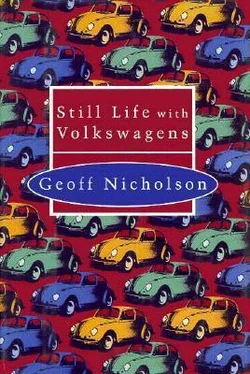“Er, yes.”
It seems pointless to say anything else, so he takes the first envelope. It feels as though it contains a small booklet, and he opens it up to discover that the booklet is a passport, and not just any old passport, but his passport, at least a passport in his name with his photograph inside. He is both surprised and affronted. How could she go behind his back like that? Okay, so she may have owned a photograph of him, but she must have filled in a passport application form without consulting him, must have even forged his signature. He thinks he has every right to feel angry and abused, but something in Debby’s face tells him it would be inappropriate and pointless to tell her this.
“Now for the question,” she says. “Will you leave this caravan and come travelling with me?”
“What?” says Barry. “When? Where to? What will we do for money?”
“A one word answer,” says Debby. “Yes or no.”
In normal circumstances he would be very happy to answer with a good many prevarications and hesitations, but he can tell that Debby in her current mood wouldn’t wear that. With great reluctance, the reluctance being because he doesn’t want to have to answer, he has to answer, “No.”
“In that case,” says Debby, “you get to open the second envelope.”
She hands him the second manila envelope and while he’s still struggling to open it, she’s got out of Enlightenment, got into her own car and driven away. He takes out a single, small sheet of paper, but by the time he’s read the message written on it, it’s more or less superfluous. It says;
Goodbye Barry. I’m off.
If you want me back you could always get in your car and find me.
One night she’s there again. It’s late. Fat Les is working alone in the garage on a Baja style Beetle, fitting Desert Dueller tyres to a set of aluminium wheels, and sanding down the body kit ready for spraying, when he hears the clack of high heels approaching, and he stops what he’s doing, looks up and sees Detective Inspector Cheryl Bronte standing in his space. The harsh overhead light is unflattering. It makes her look older and more lined, but it also makes her look harder and more formidable.
“Hello Les,” she says.
“Yes?” he says.
“That’s an ugly looking thing you’re working on there,” she says nodding at the Beetle.
“Well, it’s all in the eye of the beholder, isn’t it?” Les replies.
“I’ve never liked Beetles much,” she says. “I don’t know why. I guess I’ve always found them too small, too slow, too noisy, maybe just a little too strange for my tastes.”
“Am I supposed to be interested in this?” Les asks.
“I thought you were interested in Beetles, that’s all,” she says and she wanders around the workshop. She is keen to appear casual, curious, unsystematic. She wants to make it clear that she is not doing anything so unsubtle as looking for clues. She picks up and considers some spare parts that are lying around on shelves and benches; a set of braided, stainless steel ignition leads, coloured window seals, some chrome push rod tubes. She appears to find them fascinating.
“You see Les,” she says, “I have a theory about you.”
“Well, I’m flattered,” he says sarcastically.
She doesn’t react. She says, “My theory is that you’re the one blowing up Volkswagens.”
“Is that a theory?” Les asks. “It sounds more like an unsubstantiated allegation to me.”
“You’re full of surprises, aren’t you, Les?”
Les doesn’t rise to that one.
She continues, “I think it might all be about mid-life crisis, the male menopause, waning sexual powers, that kind of thing.”
“Oh really?”
“About the fact that you’re socially retarded, about being stuck in a perpetual adolescence. I mean, think about it, the Beetle is a car of the young, and let’s face it Les, young, you’re not.”
“I never was.”
“My theory, my assertion, is that you see all these kids coming through this place, all with money and ideas, having their cars tarted up, going out partying, raving, getting high, getting laid, and it makes you feel very jealous. Why wouldn’t it? Anybody might feel the same. Anybody might get angry and resentful. The difference is, you want to destroy. You want to destroy Volkswagens.”
“Why would I want to destroy the thing I make my living out of?”
“Men always destroy the thing they love.”
“I don’t love ‘em. I just make a living out of them.”
“That’s what you say. Volkswagens are nothing special to you. You’re not obsessed by them, you’re not hung up on them.”
“Too bloody true.”
“You don’t fool me Les.”
“You don’t fool me, either,” Les barks, finally losing his rag. “Okay, you’ve told me your bloody theory, now arrest me or leave me alone.”
“It’s not just a theory,” she says softly.
“This is fucking silly,” says Les. “You don’t know anything about me, and what you think you know is completely wrong.”
“You wish,” she says.
“You’re crazy,” says Les. “What possible evidence have you got against me?”
“You don’t seriously think I need evidence do you? I just know. Call it instinct, call it a gut feeling. Sometimes I think it’s more like a sixth sense, a kind of precognition.”
Les is looking and feeling like a cornered rat. How can he prove his innocence to someone who has established his guilt through extrasensory means?
“Besides,” says Cheryl Bronte, “you’re a fat bastard and I don’t like the look of you. I’m coming for you Les. I know where you live. I’ll see you again.”
♦
Marilyn does not want to believe that her father is the kind of man who would kidnap her current boyfriend and then blow up one of his cars. But she realises that the fact she doesn’t want to believe it is neither here nor there. She’d rather believe that her father is safe, sober and well-balanced, but he is clearly none of the above.
If her father was going to kidnap anyone surely it ought to be Barry bloody Osgathorpe. He was the one who drove her father insane. There would be some logic, some sense in taking revenge on him. But why Carlton? Just because he collects Volkswagens? It seems reasonable enough that her father should hate Volkswagens after all that he’s been through, but that hardly justifies kidnapping Carlton. And how would her father know that Carlton was a collector? How would he know that Carlton even existed? How would he know he was her boyfriend? Well actually it has been in one or two gossip columns, if her father was allowed to read gossip columns in the asylum, but still…
He’s out there right now, somewhere, who knows where, and what the hell is he doing? Sleeping in ditches, in shop doorways? And how is he managing to live? By begging? By stealing? She tries to picture it, but mercifully she can come up with nothing.
Ever since Carlton disappeared she has been staying in his house rather than her own place. The fact that his house is a rambling gentleman’s residence while hers is a studio flat has nothing to do with it, she insists. She feels safe here. There is a high wall around the garden, closed circuit cameras that pick out wanted or unwanted guests, a wrought iron security gate that can only be opened from within the house; not that any of that was enough to save Carlton.
She meanders slowly from one room to another, looking at the diversity and profusion of his Volkswagen collection. It all feels special to her. It’s all so terribly Carlton. And yet without him it seems so inert, like a deserted museum, a burial chamber. But she needs to be there in case Carlton returns, or in case someone delivers a ransom note, or in case the police suddenly solve the crime (which seems totally unlikely), or in case the worst happens, the worst still being mercifully undefined. She doesn’t understand the police. She has been interviewed twice by this Cheryl Bronte woman, but the interviews haven’t been much more than general, perfunctory little chats. The woman seems barely interested, doesn’t even seem wholly convinced that Carlton has actually been kidnapped. Marilyn doesn’t see why they can’t launch a vast nationwide media campaign, get every person in the land to go searching through basements and sheds and disused buildings, looking for her Carlton. Failing that, they could always put out a wanted poster for her father, not that she’s told the police that she suspects her father might be behind it all, that would be giving too much away.
Читать дальше












